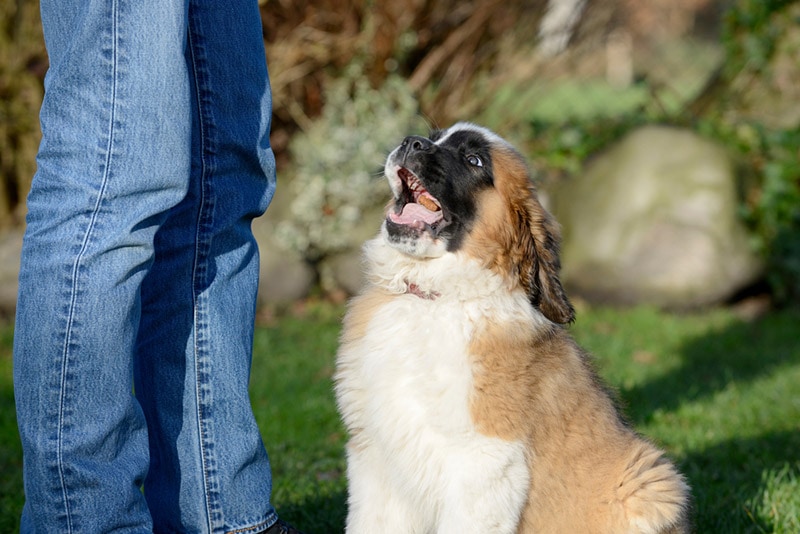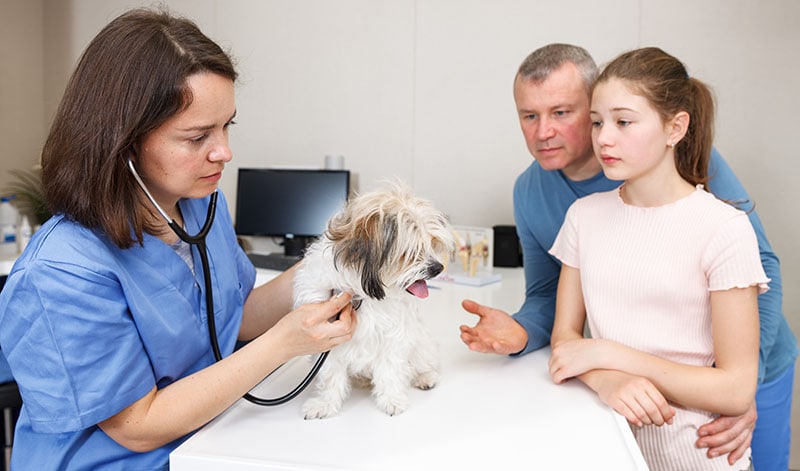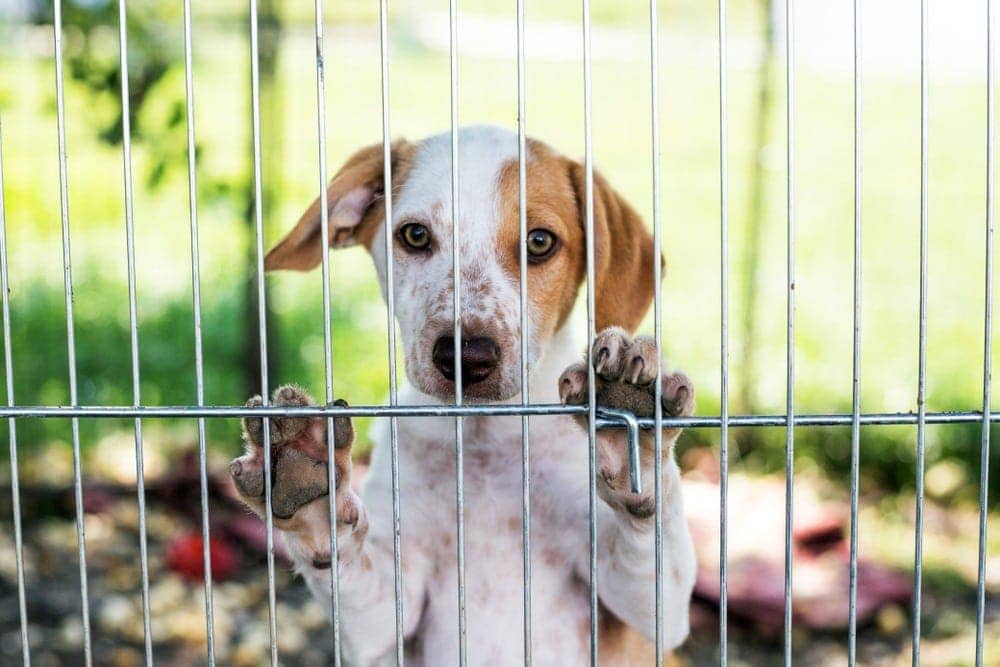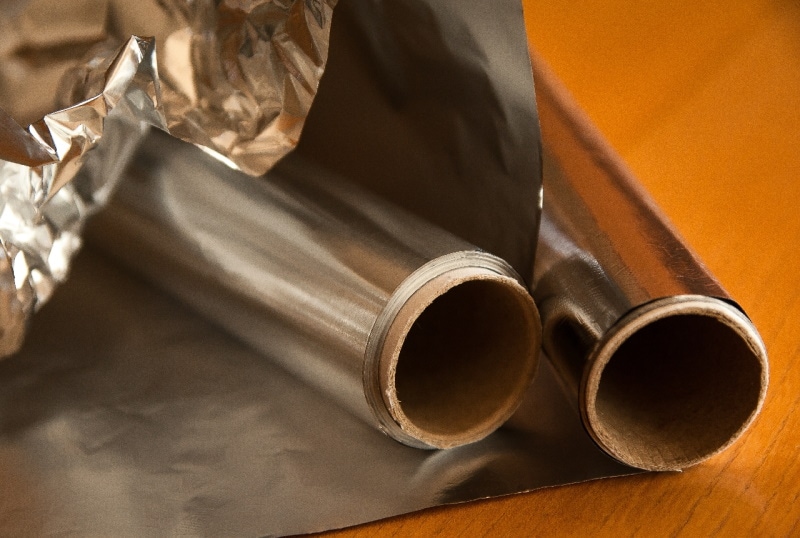Why Do Puppies Whine? 8 Vet-Reviewed Reasons
Updated on

Puppies are easily one of the cutest things that most people encounter on a regular basis, and their antics and behaviors can be a blast to watch. Puppies, like human babies, have to spend a lot of time exploring the world around them, which can be quite endearing to witness.
Seeing a puppy go from an unsure baby to a confident adult dog is certainly rewarding, but you will have to work through some things as your pup ages, from teething to house training. One of the most common things that puppies regularly do that might drive you a little crazy is whining. Why do they whine so much?
The 8 Reasons Puppies Whine
1. Seeking Mom
When puppies are first born, they only have one means of communication. They communicate with their mother through a variety of whines and yips. These whines are used to alert the mother to anything the puppy needs, whether it’s food or warmth.
Whining is especially common in very young puppies whose eyes and ears are still closed. They are fully reliant on their mother for anything and everything they could possibly need during this phase. As they age, puppies will become more independent, but it’s not uncommon for older puppies that are still with their mother to whine for her attention, and is something that will often persist once they are weaned.
2. Distress
Distressed puppies commonly whine, and there are multiple things that can cause distress for your pup. Stressful situations, loud noises, new environments, and hunger can all be difficult for your puppy to deal with. In these situations, your puppy may whine in an attempt to get someone’s attention to help them deal with the situation.
When they’re young, they expect their mother to respond to their whining, but once your puppy is away from its mother, it may still whine. This is because your puppy will learn to associate you as a motherly figure for them since you provide them with care, so they may whine to let you know they need your support.

3. Separation or Loneliness
It’s not at all uncommon to hear puppies crying or even barking when they’re left alone, especially when it’s the first time they’ve ever been alone. Young puppies are accustomed to having constant companionship, whether it’s with their mother or their litter mates. Once they’re weaned and taken away from their littermates and mother, it can be a very tough adjustment for them. They’ve spent their entire lives to this point whining when they want or need something, so learning that whining isn’t always the right way to get your attention can be difficult.
Crate training can be an especially difficult time for them since they are often left completely alone, so you may experience lots of whining during this training period. It’s important for your dog that they learn to be alone, though. Being able to spend time alone without fear or stress will help your puppy become a confident adult.
4. Frustration
There are a lot of reasons that your puppy may become frustrated, but all of them can lead to whining. Hunger, wanting a special treat, or a toy being out of reach can all lead to your puppy whining. They may also get frustrated if they’ve given you a cue they need to go outside to potty, and you haven’t taken them.
During house training, your pup is learning a new skill they haven’t had to practice before, so make sure to pay close attention to the potty cues you’ve taught them. They may become frustrated if they are trying not to have an accident and feel like you aren’t noticing the need.

5. Illness
Sick puppies often whine, and it’s not uncommon for sick adult dogs to whine as well. If your pup seems to be whining for no particular reason, try to evaluate if they may not be feeling well. If your puppy isn’t feeling well, they likely will exhibit symptoms other than whining, like lethargy, inappetence, and vomiting or diarrhea.
Puppies can go downhill quickly when they are sick, especially since they are susceptible to deadly diseases like parvo and distemper. If your puppy seems to not be feeling well, it’s best to have them evaluated by a vet to rule out a serious medical condition.
6. Pain
Just like with illness, puppies may whine when they are in pain. This can occur with expected pain, like after a surgical procedure, or unexpected pain, like an injury. Just like with humans, pain medicine may not completely eliminate your pup’s pain, so whining during a time of pain can be somewhat expected. However, it may indicate that the pain level is not being adequately controlled.
If your puppy is whining due to pain, it’s best to contact your vet to get their guidance. Never give your puppy human pain meds unless they are prescribed to your pup by a veterinarian. Over-the-counter and prescription medications can be extremely harmful to puppies and adult dogs alike.

7. Confinement
Confinement can cause your puppy to whine, and not just confinement like a crate or a cage. If your puppy is leashed and can’t reach something or in your yard and unable to reach something through the fence, they may whine about it.
Whining during confinement is typically due to frustration or loneliness and can even be a combination of both. As previously mentioned, helping your pup learn to be comfortable with confinement and being alone will help them become confident dogs. Confinement may feel like a punishment to your pup, so make sure to keep all confining activities positive and enjoyable to help your puppy learn.
Puppies may also whine due to confinement if they are stuck, which can be a stressful and sometimes painful situation for them. If your puppy is whining, it’s a good idea to peek at them to make sure they haven’t gotten themselves into a sticky situation.
8. Attention
Just like with small children, your puppy may whine simply because they want you to pay attention to them. There doesn’t have to be any specific reason that your pup wants your attention, though. Some puppies just whine because you aren’t petting them, playing with them, or looking at them. Whining for attention is typically considered an undesirable behavior, so work on training your puppy to use other methods to get attention, like bringing you a toy or sitting down next to you.
Your puppy also needs to learn that just because they want your attention doesn’t mean they will always get it. Sometimes you’ll be unable to pay attention to their request, and your puppy needs to learn how to be comfortable with that.

Should Whining Puppies Be Ignored?
The answer to this question is very dependent on the situation, so make sure to take stock of your individual situation before deciding if you should ignore your puppy’s whining or not. Firstly, ensure your pup is not trapped or in pain. During the first couple of days that your puppy is with you, responding to their whining is often a good idea. This will help them understand that you are there to meet their needs, building trust and comfort. The first few days in a new home can be extremely stressful for a puppy, especially if they’ve just left their mother and littermates for the first time. However, if you continue to reward whining with attention or fuss, you will find yourself with a very noisy companion.
When it comes to crate training, the purpose of using a crate is to have somewhere safe and secure where your puppy feels comfortable when alone. Part of this training should be to make their crate cozy and appealing, with beds or blankets (that might get destroyed!) and toys that are safe. Keep the crate in a quiet part of the house and encourage them to use it during the day, with the door open, to enjoy a treat or a fuss; the crate should be a happy place. Overnight is the time to ignore the whine. The first few nights will be the toughest, but ignoring those plaintive yelps will be worth it in the end. Remember, everytime you go to them during the night, you are rewarding and reinforcing the behavior. A few sleepless nights will be worth it in the long run once your pup learns that their little “bedroom” is their quiet safe place. Aim to have a crate that is large enough to allow bedding at one end and a puppy pad at the other, in case of overnight accidents. Always leave a small, shallow bowl of water with them overnight, but do not fill it too much; just enough for a few mouthfuls. This will help them learn to hold their bladder until morning, and reduce the risk of overnight pool parties. Make sure you only let them out again when they are quiet – remember, this puppy training business takes a lot of patience!
If your puppy whines to be let out to the toilet, you definitely want to pay attention to it! This is probably the one good time to whine as it is telling us something useful and helping with toilet training.
Conclusion
While a whining puppy can be annoying, it’s important to remember that puppies are just babies. They learn early on that whining gives them attention and provides them with comforting outcomes, like food and warmth. Sometimes, puppies are whining for appropriate reasons and it’s your job as their owner to help make them comfortable to build trust and confidence. Each situation is a little bit different, so if you’re struggling to know how to respond to your puppy’s whining, consult with a trainer or a vet for advice.
See Also:
Featured Image Credit: Vladimir Nenezic, Shutterstock















